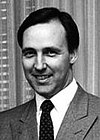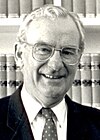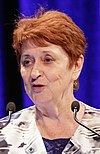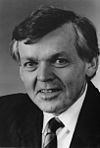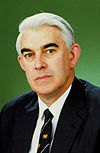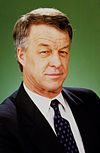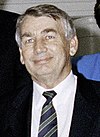
Robert James Lee Hawke was an Australian politician who served as the 23rd prime minister of Australia from 1983 to 1991, holding office as the leader of the Australian Labor Party (ALP). He was a member of parliament (MP) for the division of Wills from 1980 to 1992.

John Malcolm Fraser was an Australian politician who served as the 22nd prime minister of Australia, in office from 1975 to 1983 as leader of the Liberal Party of Australia.

Simon Findlay Crean is an Australian politician and trade unionist. He was the Member of Parliament for Hotham from 1990 to 2013, representing the Labor Party, and served as a Cabinet Minister in the Hawke, Keating, Rudd and Gillard Governments. He was the Leader of the Labor Party and Leader of the Opposition from November 2001 to December 2003.

Andrew Sharp Peacock was an Australian politician and diplomat. He served as a cabinet minister and went on to become leader of the Liberal Party on two occasions, leading the party to defeat at the 1984 and 1990 elections.

Sir Billy Mackie Snedden, was an Australian politician who served as the leader of the Liberal Party from 1972 to 1975. He was also a cabinet minister from 1964 to 1972, and Speaker of the House of Representatives from 1976 to 1983.
The Fourth Fraser Ministry was the 53rd ministry of the Government of Australia. It was led by the country's 22nd Prime Minister, Malcolm Fraser. The Fourth Fraser Ministry succeeded the Third Fraser Ministry, which dissolved on 3 November 1980 following the federal election that took place in October. The ministry was replaced by the First Hawke Ministry on 11 March 1983 following the federal election that took place on 5 March which saw Labor defeat the Coalition.
The Second Hawke Ministry (Labor) was the 55th ministry of the Government of Australia. It was led by the country's 23rd Prime Minister, Bob Hawke. The Second Hawke Ministry succeeded the First Hawke Ministry, which dissolved on 13 December 1984 following the federal election that took place on 1 December. The ministry was replaced by the Third Hawke Ministry on 24 July 1987 following the 1987 federal election.
The Third Hawke Ministry (Labor) was the 56th ministry of the Government of Australia. It was led by the country's 23rd Prime Minister, Bob Hawke. The Third Hawke Ministry succeeded the Second Hawke Ministry, which dissolved on 24 July 1987 following the federal election that took place on 11 July. The ministry was replaced by the Fourth Hawke Ministry on 4 April 1990 following the 1990 federal election.
The Fourth Hawke Ministry (Labor) was the 57th ministry of the Government of Australia. It was led by the country's 23rd Prime Minister, Bob Hawke. The Fourth Hawke Ministry succeeded the Third Hawke Ministry, which dissolved on 4 April 1990 following the federal election that took place on 24 March. The ministry was replaced by the First Keating Ministry on 20 December 1991 following the resignation of Hawke as Prime Minister after a successful leadership challenge by Paul Keating.
The First Keating Ministry (Labor) was the 58th ministry of the Government of Australia. It was led by the country's 24th Prime Minister, Paul Keating. The First Keating Ministry succeeded the Fourth Hawke Ministry, which dissolved on 20 December 1991 following the successful leadership challenge by Keating and subsequent resignation of Bob Hawke as Prime Minister. The ministry was replaced by the Second Keating Ministry on 24 March 1993 following the 1993 federal election.

The 1987 Australian federal election was held in Australia on 11 July 1987, following the granting of a double dissolution on 5 June by the Governor-General Sir Ninian Stephen. Consequently, all 148 seats in the House of Representatives as well as all 76 seats in the Senate were up for election. The incumbent Australian Labor Party, led by Prime Minister Bob Hawke, defeated the opposition Liberal Party of Australia, led by John Howard and the National Party of Australia led by Ian Sinclair. This was the first, and to date only, time the Labor Party won a third consecutive election.

The 1984 Australian federal election was held in Australia on 1 December 1984. All 148 seats in the House of Representatives and 46 of 76 seats in the Senate were up for election. The incumbent Labor Party led by Prime Minister Bob Hawke defeated the opposition Liberal–National coalition, led by Andrew Peacock.
Ross Vincent Free is a former Australian politician who served as a Labor member of the Australian House of Representatives representing the seat of Macquarie from 1980 until 1984, then Lindsay from 1984 until 1996. He served as a minister from 1990 until 1996 in both the Hawke and Keating ministries.

The 1983 Australian federal election was held in Australia on 5 March 1983. All 125 seats in the House of Representatives and all 64 seats in the Senate were up for election, following a double dissolution. The incumbent Coalition government which had been in power since 1975, led by Malcolm Fraser and Doug Anthony, was defeated in a landslide by the opposition Labor Party led by Bob Hawke. This was the first of 5 consecutive election victories for the Labor party. This election marked the end of the 3 term 7 year Liberal-National Coalition Fraser Government and started the period of the 5 term 13 year Hawke-Keating Labor Government. The Coalition would spend its longest ever period of opposition and the Labor party would spend its longest ever period of government at the federal level. The Coalition would not return to government until the 1996 election.

Christopher John Hurford was a Labor member of the Australian House of Representatives seat of Adelaide from 1969 to 1987. He played a key role in the development of Australia's skills-oriented immigration policy, and founded the ALP Labor Unity faction in SA.

Stewart John West is a former Australian politician. He represented the Australian Labor Party (ALP) in the House of Representatives from 1977 to 1993, holding the New South Wales seat of Cunningham. He was a member of cabinet in the Hawke Government, serving as Minister for Immigration and Ethnic Affairs (1983–1984), Housing and Construction (1984–1987), and Administrative Services (1987–1990).

The Hawke Government was the federal executive government of Australia led by Prime Minister Bob Hawke of the Australian Labor Party (ALP) from 1983 to 1991. The Government followed the Liberal-National Coalition Fraser Government and was succeeded by another Labor administration, the Keating Government, led by Paul Keating after an internal party leadership challenge in 1991. Keating served as Treasurer through much of Hawke's term as Prime Minister and the period is sometimes termed the Hawke-Keating Government.

The Keating Government was the federal executive government of Australia led by Prime Minister Paul Keating of the Australian Labor Party from 1991 to 1996. The Government followed on from the Hawke Government after Paul Keating replaced Bob Hawke as Labor leader in an internal party leadership challenge in 1991. Together, these two governments are often collectively described as the Hawke-Keating Government. The Keating Government was defeated in the 1996 federal election and was succeeded by the Howard Coalition government.

The Fraser Government was the federal executive government of Australia led by Prime Minister Malcolm Fraser. It was made up of members of a Liberal-Country party coalition in the Australian Parliament from November 1975 to March 1983. Initially appointed as a "caretaker" government following the dismissal of the Whitlam Government, Fraser won in a landslide at the resulting 1975 Australian federal election, and won substantial majorities at the subsequent 1977 and 1980 elections, before losing to the Bob Hawke-led Australian Labor Party in the 1983 election.
Labour government or Labor government may refer to:




